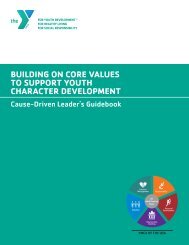CDLI_Guidebook_18_Final_Print
You also want an ePaper? Increase the reach of your titles
YUMPU automatically turns print PDFs into web optimized ePapers that Google loves.
YOUTH DEVELOPMENT LEADER<br />
SELF-REFLECTION TOOLS FOR EACH<br />
PRACTICE AREA<br />
What does the data tell us?<br />
What does this tool measure?<br />
The Y-USA Character Development Learning<br />
Institute Youth Development Leader Self-<br />
Reflection tool was developed by Y-USA to<br />
help youth development leaders, and other<br />
leaders within the organization, reflect on<br />
items related to the interactions between<br />
staff/volunteers and youth during program<br />
activities for each practice area. The Youth<br />
Development Leaders then rate themselves<br />
on a 1-3 scale based on their confidence in<br />
supporting character development in youth.<br />
ORGANIZATION LEVEL<br />
PROGRAM LEVEL<br />
YOUTH<br />
DEVELOPMENT<br />
LEADER LEVEL<br />
Capacity Assessment<br />
Algorhythm Adult Survey<br />
Self Reflection<br />
Algorhythm Youth<br />
Survey or PEAR Survey<br />
External & Internal<br />
Observation (SEL PQA)<br />
Program Reflection<br />
This tool provides data at the Youth Development Leader level and can be used to inform individual staff<br />
professional development, program professional development, capacity building and current smart goals<br />
in the PIP.<br />
How does this tool define SEL?<br />
Adults support youth to be aware<br />
of and constructively handle both<br />
positive and challenging emotions.<br />
Adults develop youth to be reliable,<br />
committed, and fulfill obligations and<br />
challenging roles.<br />
Emotion<br />
Management<br />
Responsibility<br />
Adults work with youth to relate<br />
to others with acceptance,<br />
understanding, and a sensitivity to<br />
diverse perspectives and experiences.<br />
Empathy<br />
CD<br />
Adult Practice<br />
Areas<br />
Personal<br />
Development<br />
Adults encourage youth to act,<br />
persist, and initiate goals and<br />
outcomes even through the ups<br />
and downs of difficult situations<br />
and challenges.<br />
Relationship<br />
Building<br />
Adults foster experiences<br />
where youth plan,<br />
collaborate, and coordinate<br />
action with others.<br />
How does this relate to the <strong>CDLI</strong> adult practice areas?<br />
These are the <strong>CDLI</strong> adult practice areas.<br />
CHARACTER DEVELOPMENT GUIDEBOOK<br />
P 39



